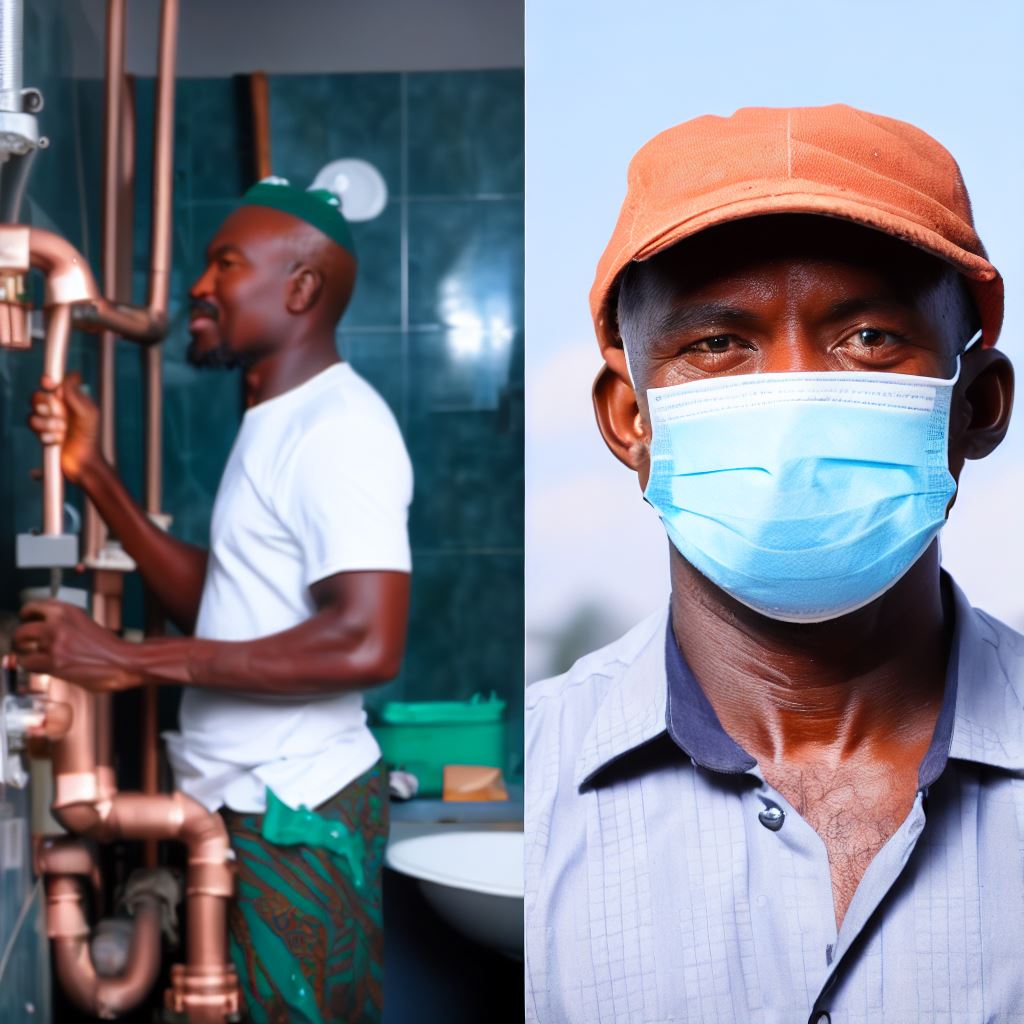Introduction
Let’s explore top plumbing projects in Nigeria: A showcase of excellence.
Plumbing projects are of utmost importance in Nigeria as they contribute to the development and maintenance of the country’s infrastructure.
These projects involve the installation, repair, and maintenance of water supply systems, sewerage systems, and drainage systems.
Effective plumbing ensures proper sanitation, safe water supply, and effective waste management in homes, schools, hospitals, and public buildings.
In this blog post, we will highlight some of the top plumbing projects in Nigeria that exemplify excellence in the field.
These projects showcase innovative approaches, advanced technology, and skilled craftsmanship.
We will explore the impact these projects have had on improving the lives of Nigerian citizens and the country’s overall development.
From large-scale plumbing projects in major cities like Lagos and Abuja to smaller community-based initiatives, we will delve into the diverse range of plumbing projects that have achieved remarkable results.
Whether it’s the construction of modern water treatment plants, the implementation of sustainable water conservation practices, or the development of efficient drainage systems, each project exemplifies excellence in its own unique way.
Through this blog post, we aim to appreciate the dedication and expertise of Nigerian plumbers and raise awareness about the significance of plumbing projects in fostering a healthier and more developed nation.
Join us as we explore the outstanding achievements of these plumbing projects and the impact they have on Nigeria’s infrastructure and its people.
First Project : Construction of Modern Sewage Systems
Importance of efficient sewage systems
- Efficient sewage systems are crucial for maintaining public health and preventing environmental pollution.
- Proper disposal of waste helps prevent the spread of diseases and ensures a safe living environment.
- Adequate sewage systems also contribute to the overall development and growth of a community.
Case study of a successful sewage system project in Lagos
In Lagos, the construction of a modern sewage system has revolutionized the way waste is managed.
The project was initiated by the government to address the increasing sewage challenges in the city.
It involved the implementation of a comprehensive network of underground pipes and treatment facilities.
Efficient sewage pumping stations were strategically located to ensure proper waste disposal and management.
The project was completed within the allocated timeframe and received positive feedback from the community.
Key features and benefits of the project
The modern sewage system in Lagos offers a cost-effective and sustainable solution for waste management.
The underground pipes enable the efficient transportation of sewage to treatment facilities.
The treatment plants employ advanced technologies to ensure the proper processing and disposal of waste.
Regular maintenance and monitoring of the system ensure its smooth operation and longevity.
The modern sewage system has significantly reduced the prevalence of diseases caused by poor waste management.
It has improved the quality of life for residents by providing a clean and hygienic living environment.
The project has also boosted the economic development of the area by attracting investments and businesses.
Furthermore, the construction of the sewage system has created job opportunities and contributed to employment generation.
Overall, the successful implementation of the modern sewage system in Lagos serves as a model for other regions in Nigeria.
In short, the construction of modern sewage systems is of utmost importance for a country like Nigeria.
Through the case study of a successful project in Lagos, we have seen the significant benefits brought by efficient sewage systems.
The key features of the project, including underground pipes, treatment facilities, and regular maintenance, have ensured proper waste management.
Not only has it improved public health and the quality of life for residents, but it has also contributed to the economic development of the area.
By implementing similar projects across the country, Nigeria can showcase its excellence in providing efficient and sustainable solutions for waste management.
Read: The Role of Plumbers in Nigeria’s Water Conservation Efforts
Second Project: Installation of Solar Water Heaters
Need for sustainable and affordable water heating solutions
Considering the dire need for sustainable and affordable water heating solutions in Nigeria, solar water heaters have emerged as a promising option.
Traditional water heating methods have been associated with high energy consumption and significant carbon emissions, contributing to environmental degradation and escalating energy costs.
As a result, the installation of solar water heaters has gained traction in recent years.
Notable solar water heater project in Abuja
A remarkable solar water heater project in Abuja serves as a prime example of the potential impact of such initiatives.
The project focused on providing sustainable and cost-effective water heating solutions to residents in a housing community.
It was a collaborative effort involving the government, non-governmental organizations, and private sector companies.
By showcasing the feasibility and benefits of solar water heaters, the project set a precedent for similar endeavors across Nigeria.
Advantages of solar water heaters and their impact on energy consumption
Solar water heaters offer numerous advantages, primarily in terms of energy consumption and cost savings.
By utilizing solar energy, these systems significantly reduce reliance on electricity or gas. Consequently, households can witness a substantial decrease in their monthly utility bills.
Moreover, the reduced environmental impact of solar energy is another key advantage.
Solar water heaters help reduce carbon emissions and dependence on fossil fuels, promoting a cleaner and more sustainable future.
Beyond financial and environmental benefits, solar water heaters also contribute to increased energy independence and job creation.
By utilizing an abundant and renewable energy source, households become less dependent on external energy supplies, which may be unreliable or expensive.
Additionally, the development, installation, and maintenance of solar water heaters create employment opportunities, boosting local economies.
Although solar water heaters may require a higher initial investment compared to traditional water heating systems, the long-term advantages are undeniable.
These systems have a long lifespan and require minimal maintenance, translating into considerable cost savings over time.
Furthermore, solar water heaters are versatile and can be adapted to both residential and commercial buildings, making them suitable for a wide range of applications.
In essence, the installation of solar water heaters represents a significant step towards achieving sustainable and affordable water heating solutions in Nigeria.
These systems offer numerous advantages, including energy and cost savings, reduced environmental impact, and increased energy independence.
The success of notable projects, such as the one in Abuja, serves as a testament to the viability and potential impact of solar water heaters.
By embracing these clean and efficient alternatives, Nigeria can pave the way for a greener future and inspire similar initiatives globally.
Read Becoming a Plumber in Nigeria: Skills and Training Needed
Third Project: Renovation of Aging Water Infrastructure
Challenges posed by deteriorating water infrastructure
- Inadequate supply of clean and potable water due to aging infrastructure.
- Frequent pipe leaks leading to wastage of water and high repair costs.
- Uneven water distribution resulting in some areas experiencing water scarcity.
- Increased risk of waterborne diseases due to poor water quality control.
- Difficulty in accessing clean water for domestic and industrial purposes.
Example of a water infrastructure renovation project in Port Harcourt
One notable example of a successful water infrastructure renovation project is the initiative undertaken in Port Harcourt.
The project involved comprehensive assessment and evaluation of the existing water infrastructure.
A team of expert engineers and technicians were employed to identify and rectify issues with the aging system.
Modern and durable pipes were installed to replace the old and corroded ones.
Advanced water treatment facilities were incorporated to improve water quality and ensure safety.
The project also included the establishment of a centralized control and monitoring system for efficient operation and maintenance.
Positive outcomes achieved through the project and its contribution to the community
The renovation project in Port Harcourt has yielded numerous positive outcomes and contributed significantly to the community:
- Improved access to clean and reliable water supply for both domestic and industrial use.
- Reduction in water wastage due to the replacement of faulty pipes and timely repairs.
- Enhanced water quality control measures resulting in a decrease in waterborne diseases.
- Increased water availability and equitable distribution, reducing water scarcity in the region.
- Boost to local economy through job creation during the construction and maintenance phases.
- Improved living conditions and health outcomes for the residents, particularly in underserved areas.
- Positive environmental impact due to reduced water leakage and conservation of water resources.
Basically, the renovation of aging water infrastructure in Port Harcourt serves as a prime example of excellence in plumbing projects.
The challenges posed by deteriorating water infrastructure were effectively addressed, leading to significant improvements in water supply and quality.
Through careful planning, expert execution, and community involvement, the project has not only resolved immediate issues but also contributed to long-term sustainable development.
The positive outcomes have had a transformative impact on the lives of the residents, emphasizing the importance of investing in the maintenance and renovation of water infrastructure across Nigeria.
Read: Women in Plumbing: Breaking Barriers in Nigeria’s Profession

Fourth Project : Implementation of Rainwater Harvesting Systems
Addressing water scarcity issues through rainwater harvesting
Rainwater harvesting is a sustainable solution to combat water scarcity in Nigeria.
With the increasing demand for water and limited freshwater resources, it becomes crucial to find alternative sources.
Rainwater harvesting involves collecting, storing, and utilizing rainwater for various purposes such as domestic use, irrigation, and groundwater recharge.
It offers a decentralized approach to meet water requirements.
By implementing rainwater harvesting systems, communities can reduce their dependency on groundwater and municipal water supply, thereby easing the burden on existing water sources.
The scarcity of water in Nigeria has led to numerous challenges, including waterborne diseases, increased competition for water resources, and environmental degradation.
Rainwater harvesting can mitigate these challenges and improve overall water security.
Showcase of a successful rainwater harvesting project in Kano
Kano State, located in northern Nigeria, has implemented a successful rainwater harvesting project to address water scarcity issues in the region.
The project involved the construction of rooftop rainwater harvesting systems in residential buildings, schools, and community centers.
Rainwater was collected from rooftops and stored in large tanks for future use.
The collected rainwater was primarily used for domestic purposes, such as drinking, cooking, and cleaning.
It helped alleviate the community’s reliance on traditional water sources, which often faced shortages during dry seasons.
The success of the project in Kano can be attributed to community participation and awareness programs.
Local residents were educated about the benefits of rainwater harvesting and trained in maintaining the systems.
Benefits of rainwater harvesting and its potential for widespread adoption
Rainwater harvesting offers several benefits, making it an attractive solution for addressing water scarcity in Nigeria:
- Water conservation: Rainwater harvesting conserves freshwater resources by utilizing rainwater instead of relying solely on groundwater and surface water sources.
- Cost-effective: Implementing rainwater harvesting systems can significantly reduce water bills, especially in areas where water supply is limited.
- Environmental sustainability: By reducing the pressure on existing water sources, rainwater harvesting helps preserve ecosystems and maintain biodiversity.
- Improved water quality: Rainwater is usually free from contaminants found in groundwater or surface water, making it suitable for various purposes.
- Enhanced resilience: Rainwater harvesting provides a decentralized water supply system, ensuring access to water even during droughts or emergencies.
Considering the benefits and success of rainwater harvesting projects like the one in Kano, there is immense potential for its widespread adoption in Nigeria.
Government support and policies can encourage the integration of rainwater harvesting systems in both urban and rural areas.
Financial incentives, educational campaigns, and technical assistance can further promote its implementation.
Collaboration between government agencies, NGOs, and communities is essential to create awareness, support capacity building, and ensure the long-term sustainability of rainwater harvesting projects.
Rainwater harvesting is a showcase of excellence in addressing water scarcity in Nigeria.
Implementing such projects across the country can pave the way for a more resilient and sustainable water future.
Read: Entrepreneurship in Plumbing: Starting a Business in Nigeria
Publish Your Professional Profile, Business or Brand
Showcase your expertise, gain trust, and boost visibility instantly on Professions.ng.
Publish NowFifth Project: Introduction of Water Treatment Facilities
Necessity of clean and safe drinking water in Nigeria
Nigeria faces a major challenge in providing clean and safe drinking water to its population.
Access to clean water is a basic human right and essential for maintaining good health.
Contaminated water sources contribute to the spread of waterborne diseases such as cholera and typhoid.
Lack of clean water also affects sanitation and hygiene practices, leading to a cycle of poor health and poverty.
Remarkable water treatment facility project in Enugu
Enugu, a city in southeastern Nigeria, has successfully implemented a water treatment facility project.
The project involved the construction of a modern water treatment plant to provide clean and safe drinking water to the residents.
The plant was designed with advanced filtration and purification technologies to ensure the removal of contaminants.
It has a large capacity, allowing it to cater to the increasing water demands of the growing population.
The facility also includes a distribution network to deliver treated water to households and institutions.
Regular maintenance and monitoring are conducted to ensure the continuous supply of clean water.
Importance of such projects in preventing waterborne diseases and promoting public health
- Water treatment facilities play a crucial role in preventing waterborne diseases in Nigeria.
- By removing harmful pathogens and contaminants, these facilities provide safe water for consumption.
- Access to clean water improves overall public health and reduces the burden of water-related illnesses.
- The introduction of water treatment facilities also promotes hygiene and sanitation practices.
- It encourages the use of clean water for cooking, drinking, and personal hygiene.
- Communities with access to clean water experience fewer cases of diarrhea, cholera, and other waterborne diseases.
- Public health facilities can focus their resources on other health issues, leading to improved healthcare services.
- Water treatment projects contribute to the achievement of Sustainable Development Goal 6, which aims to ensure universal access to clean water and sanitation.
In general, the introduction of water treatment facilities in Nigeria, such as the remarkable project in Enugu, is crucial for providing clean and safe drinking water to the population.
Access to clean water is a basic necessity and a fundamental right for maintaining good health.
These facilities not only prevent waterborne diseases but also promote public health by improving sanitation and hygiene practices.
It is essential to invest in such projects to ensure a healthy and prosperous future for Nigeria.
Explore Further: Women in Solar PV Installation: Nigeria’s Scene
Conclusion
The showcase of excellence in Nigeria’s plumbing sector is evident through the highlighted projects.
These projects have not only solved plumbing challenges but have also demonstrated the highest level of skill and expertise.
From the construction of water treatment plants to the installation of state-of-the-art plumbing systems in residential and commercial buildings, Nigeria has shown its commitment to excellence.
These plumbing projects have undoubtedly improved the quality of life for Nigerians by providing access to clean water, proper sanitation facilities, and efficient plumbing systems.
The dedication and technical proficiency exhibited by the professionals involved in these projects are commendable and deserve recognition.
Furthermore, the achievements showcased in Nigeria’s plumbing sector should serve as an inspiration for further development and innovation.
As the country continues to grow and urbanize, there will be an increasing demand for advanced plumbing solutions to meet the needs of a rapidly expanding population.
This presents an opportunity for plumbers, engineers, and entrepreneurs to develop new and innovative ways of addressing plumbing challenges.
It is essential to encourage collaboration between industry professionals, government agencies, and educational institutions to promote the exchange of knowledge and skills in Nigeria’s plumbing sector.
By investing in training programs, research, and development, Nigeria can ensure that its plumbing sector remains at the forefront of excellence and continues to contribute to the nation’s growth and development.
In a nutshell, Nigeria’s plumbing sector has showcased excellence through its projects, and there is great potential for further development and innovation.
With the right support and collaboration, Nigeria can continue to demonstrate its commitment to excellence in plumbing and meet the evolving needs of its population.




